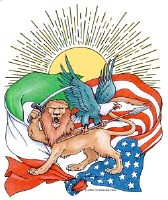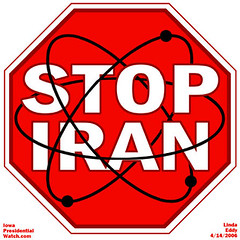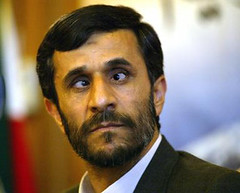Some background for context.
The most senior Sepah/IRGC (both names refer to the paramilitary Revolutionary Guards) officer killed in the latest explosion was Major General (two star, currently highest rank permitted in Islamic Iran) Moghadam Tehrani, who has been credited with being the "father" of Iran's missile technology and administration. He was also part of the former Sepah Chief Commander Mohssein Rezai's clique, even though he is not from Southern Iran as are three other very important IRGC leaders in the same splinter clique: Massoud Hejazi now assigned as the personal Chief of the Supreme Leader's Khamenei's protection and information unit and Ghassem Soleimani formerly Sepah commander of the Zahedan region and now Chief of the "Ghods" (Jerusalem), Special Forces the most vicious overseas operations military and spy arm of Islamic Iran.
An opposing faction murdered Rezai's son in Dubai a few days ago so the internal Sepah conflicts are becoming inceasingly deadly.
This reflects a very similar but less physically violent splintering among the hierarchy of clerics/Mullahs, specially the most senior ones like Rafsanjani, who have been sniping verbally at each other and acusing each other of not conforming to the aims of the Ayatollah Rouhallah Khomeini (not the current Supreme Leader Ali Khamenei but the original founder of the Islamic regime in Iran).
And various self-serving strata of fiscal and financial leaders lke the Bazaar merchants and the virtual total take-over of major busines and industrial deals by the Sepah.
This article by Dareini provides a decent backdrop:
Dead Guard commander was missile expert
By ALI AKBAR DAREINI,
TEHRAN, Iran (AP) — A Revolutionary Guard commander killed in an explosion at an ammunition depot west of Tehran was a key figure in Iran's missile program, the elite military force said in a statement Sunday.
Gen. Hasan Moghaddam was killed together with 16 other Guard members Saturday at a military site outside Bidganeh village, 25 miles (40 kilometers) southwest of Tehran. The Guard said the accidental explosion occurred while military personnel were transporting munitions.
Alan note: what were all these very senior Sepah officers doing in a warehouse way at the back? Were there any North Koreans present? Were any killed? Specially as missile storage has been moved to enlarged caves in a nearby mountain range! What technology was being demonstrated? Was the explosion a opportunistic pinpoint missile strike on this rarely gathered group of top Generals?
The Guard praised Moghaddam, saying the military force will not forget his "effective role in the development of the country's defense ... and his efforts in launching and organizing the Guard's artillery and missile units," the semiofficial Fars news agency quoted the statement as saying Sunday.
The Revolutionary Guard is a key Iranian military force closely tied to the country's powerful clerics.
Alan note: significantly Supreme Leader and his middle son Mojtaba.
Moghaddam headed a "self-sufficiency" unit of the Guard's armaments section.
Iranian officials did not explain why Moghaddam was at the site at the time of the explosion.
Saeed Qasemi, a Guard commander, said Iran owes its missile program to Moghaddam.
"A major part of (our) progress in the field of missile capability and artillery was due to round-the-clock efforts by martyr Moghaddam," Qasemi told the conservative news website rajanews.com.
Another Guard commander, Gen. Mostafa Izadi, called Moghaddam a "founder of the Guard's surface-to-surface missile systems."
An exiled Iranian dissident group, the Mujahedin-e Khalq or MEK, has claimed that the blast hit a missile base run by the Revolutionary guard rather than an ammunition depot.
Lawmaker Parviz Soroori was sure the blast was accidental.
"No sabotage was involved in this incident. It has nothing to do with politics," Soroori was quoted as saying by the parliament's website, icana.ir.
Qasemi said Moghaddam was one of a few Guard commanders favored by Iran's Supreme Leader Ayatollah Ali Khamenei.
"The exalted leader had a special interest in him," he said.
Iran's arsenal boasts missiles with a range of about 1,250 miles (2,000 kilometers) that were designed for (use against) Israel and U.S. targets. The missile capability, along with Iran's nuclear program, are among the reasons why Israel considers Iran its most dangerous enemy.
The Revolutionary Guard, Iran's most powerful military force, is in charge of Iran's missile program.
Iran's chief Guard commander, Gen. Mohammad Ali Jafari, and other top officials visited Moghaddam's family Sunday to offer condolences. Moghaddam's body will be buried Monday.
AND here are some other Iran related items aggregated by United Against a Nuclear Iran (UANI)
WSJ: "A group of Iranian dissidents for the first time openly called on their government to suspend uranium enrichment, in an open letter published Monday that adds to the momentum of the international effort to convince Tehran to abandon its alleged nuclear weapons program. 'The current deadlock over Iran's nuclear ambitions and empty power play will set the stage for war and the people of Iran will have to pay the price,' said the letter.
The Iranian government considers its nuclear program a matter of national pride, and there has been broad domestic political support to stand firm. But discontent in Iran about the pursuit of a nuclear program at any price appears to be rising, as Iranians grapple with a weak economy buffeted by international sanctions and fear further sanctions on the horizon...
On Monday, one of Iran's main reformist political parties said in a statement that the regime bears the moral responsibility of getting Iran out of the current deadlock. The reformists, though favoring more openness and democracy in a country dominated by conservative political forces, have in the past voiced support for a peaceful nuclear program- but are beginning to express disapproval of the way the government is pursuing it at all costs." http://t.uani.com/vmaYYe
WT: "Iran is contemplating violently shutting down shipping in the Persian Gulf as one of several counterattack options if Israel strikes its nuclear facilities, regional and intelligence analysts say. Such attacks would present the Obama administration with the option of undertaking a limited war against Iran by striking its warships and shore-based anti-ship missiles to keep the Gulf open for business.
Former CIA analyst Larry C. Johnson said Iran has enough firepower to effectively close the Gulf and Strait of Hormuz, through which 40 percent of all the world's oil moves. 'One of the things that Iran has exercised, has the capability to do, is shut down the Persian Gulf,' Mr. Johnson said. 'The best-case scenario is they shut it down for a week. The worst case is they shut it down for three to four months.'" http://t.uani.com/uE69bM
Daily Caller: "United Against Nuclear Iran, a bipartisan organization focused on the dangers posed by the Islamic state's nuclear weapons program, wants to know where America's presidential candidates stand. The high-profile organization submitted 17 questions to President Obama and each of the Republican candidates on Friday.
They touch on subjects ranging from whether to classify Iran as a wartime enemy, to how to convince China and Russia to take part in punitive sanctions against the country. Candidates are also asked to sign a pledge stating they would 'take all necessary action through diplomacy, sanctions, covert action and if necessary the military' to stop Iran from becoming a nuclear-armed state.
'UANI is hoping to provide voters with a clear and unambiguous understanding of the candidates' positions on the danger of a nuclear-armed Iran, and how they would act if elected president,' Nathan Carleton, the organization's spokesman, told The Daily Caller." http://t.uani.com/sZOCpY
Nuclear Program & Sanctions
Reuters: "The New York County District Attorney's office will soon announce enforcement actions against additional foreign banks that helped Iran and other U.S.-sanctioned countries access the U.S. financial system, Manhattan District Attorney Cyrus Vance, Jr said on Monday.
Vance did not specify what banks were being targeted, but an official in his office said half a dozen were under investigation.
Since January 2009, three banks: Swiss banking giant Credit Suisse AG , as well as Britain's Barclays Bank Plc BARCBB.UL and Lloyds TSB Bank, have admitted engaging in sanctions-evasion assistance and forfeited a total of more than $1 billion to federal and New York County prosecutors.
Some of the money has also gone to the Treasury Department's Office of Foreign Assets Control. These payments settled prosecutors' claims the banks 'stripped' wire transfer payment messages of information that would have revealed that sanctioned parties were engaging in U.S. dollar transactions clearing through New York City." http://t.uani.com/rRU6dy
Reuters: "European Union foreign ministers spoke out in favor of tougher sanctions against Iran Monday, but decided to wait until their next meeting on Dec 1. before taking further action. The ministers, meeting in Brussels, also ruled out any military action for now, despite last week's conclusion by the International Atomic Energy Agency (IAEA) that Tehran had worked on designing a nuclear bomb.
(Alan note: European countries have continued trading HEAVILY with Iran and are dragging their heels against taking stronger actions against their prime trading partner. On the other side is the obvious threat of a nuclear Iran, which will not only kill off this trade but the European economies, so they are caught between a rock and a hard place. Supporting a strike on Iran seems to be coming out as the lesser of the two evils.)
'The Council will continue to examine possible new and reinforced measures and revert to this issue at its next meeting, taking into account Iran's action,' the ministers said in a statement. The United States and Israel have refused to rule out any way of stopping Iran from acquiring a nuclear arsenal. But the EU ministers limited themselves to condemning Iran's expanding uranium enrichment program and expressing concern over the IAEA findings that Iran was developing military nuclear technology." http://t.uani.com/trUmyJ
Foreign Affairs
BBC: "Iran influenced Baghdad's decision to refuse to allow the US to keep troops in Iraq beyond the end of this year, a senior adviser to Iraqi Prime Minister Nouri Maliki has told the BBC. Under the current agreement, the US must withdraw all its remaining forces from Iraq by 31 December. The admission will fuel speculation about Iran's growing influence in Iraq, as US forces leave.
Iraq's decision was a humiliating moment for the United States.
Washington had lobbied hard, and publicly, for a new agreement that would allow the US to keep a contingent of several thousand soldiers in Iraq. After months of indecision, in October, the government in Baghdad said no - or at least not under conditions acceptable to the Pentagon. Some detected the hand of Iran behind the decision. Adviser Sa'ad Youssef al-Mutalabi says that while the decision had been Iraq's, Iranian sensitivities had played their part." http://t.uani.com/ulg7ik
WashPost: "In an action that could increase tensions between Iran and Arab monarchies, two Iranian ships in the Persian Gulf carrying Shiite activists to Bahrain were turned back Monday by warships belonging to a coalition of gulf states that is aiding the island kingdom in its crackdown on anti-government demonstrators, according to the activists' Web site.
The Shiite activists, members of the Islamic Revolution Supporters Association, said the Iranian government did not prevent them from sailing. But halfway to Bahrain, they decided to return to Iranian waters because of 'the emergence of threats from the ships of the Peninsula Shield Force and the possibility of attacks,' the Hameyema Web site stated Monday." http://t.uani.com/lDCguR
AP: "Iranians traveling to Israel could go to prison for up to five years instead of only three months, after Iran's parliament revised an existing ban for such trips. The measure reflects Tehran's security concerns over archenemy Israel. Iran claims to have dismantled several purported Israeli spy rings in recent years and arrested Iranians with alleged links to Mossad. Iranian state TV on Monday reported that parliament passed a new amendment, expanding the current prison term for travel to Israel to between two and five years." http://t.uani.com/svQkGZ
Opinion & Analysis
James Kirchick in WSJ: "Last week's International Atomic Energy Agency report on Iranian nuclear activities has understandably ruffled feathers in American and European foreign-policy circles.
Among other damning conclusions, the report finds that 'Iran has carried out activities relevant to the development of a nuclear device' and 'had been provided with nuclear explosive design information.' Governments in the U.S. and Europe have cited the IAEA report as evidence of Iran's continued defiance of international law.
A Russian government statement last Wednesday, by contrast, ridiculed it as 'a compilation of well-known facts that have intentionally been given a politicized intonation.' The Russian statement, which could be mistaken for something produced by the Iranian regime, alleged that the report's authors 'resort to assumptions and suspicions, and juggle information with the purpose of creating the impression that the Iranian nuclear program has a military component.'
Moscow's reaction serves as a stunning rebuke to U.S. President Barack Obama, whose administration has staked much on obtaining greater Russian cooperation on Iran's nuclear program.
When President Obama was selling the New Strategic Arms Reduction Treaty, or New Start, to the U.S. Senate last year, he promised that a major benefit would be that it would put Russia on America's side in preventing Iran from getting nuclear weapons.
'We can't jeopardize the progress that we've made in securing vulnerable nuclear materials, or in maintaining a strong sanctions regime against Iran,' Mr. Obama said last November...
While Russia's reaction to the IAEA report should serve as an embarrassment to those in Washington who touted the reset, more serious is the effect that continued Russian intransigence will have on preventing Iran from obtaining nuclear-weapons capability. In response to the report, Russia has said it would block any new sanctions by wielding its veto power at the United Nations Security Council.
'The world community will see all additional sanctions against Iran as an instrument of regime change in Tehran,' Deputy Foreign Minister Gennady Gatilov told the Interfax News Agency. 'This approach is unacceptable to us, and the Russian side does not intend to consider such a proposal.' ...
The hope that a revanchist Russia, led by Vladimir Putin, will support a tougher stance against Tehran assumes that Moscow shares the West's view that a nuclear Iran is against its interests. Judging by their reaction to the IAEA report, the Russians don't see things this way.
For one, a nuclear Iran would upset the political order of the Middle East, overturning America and its allies as the status-quo powers. 'Iran is a mania with the Americans; it's not our problem,' a Putin adviser reportedly said in 2009. Indeed, if forestalling a nuclear Iran were so plainly in Russia's interest, Moscow would have sided with the U.S. and its allies long ago, and would not have to be haggled into taking a tougher line.'" http://t.uani.com/vo93bL
Subscribe to:
Post Comments (Atom)














No comments:
Post a Comment